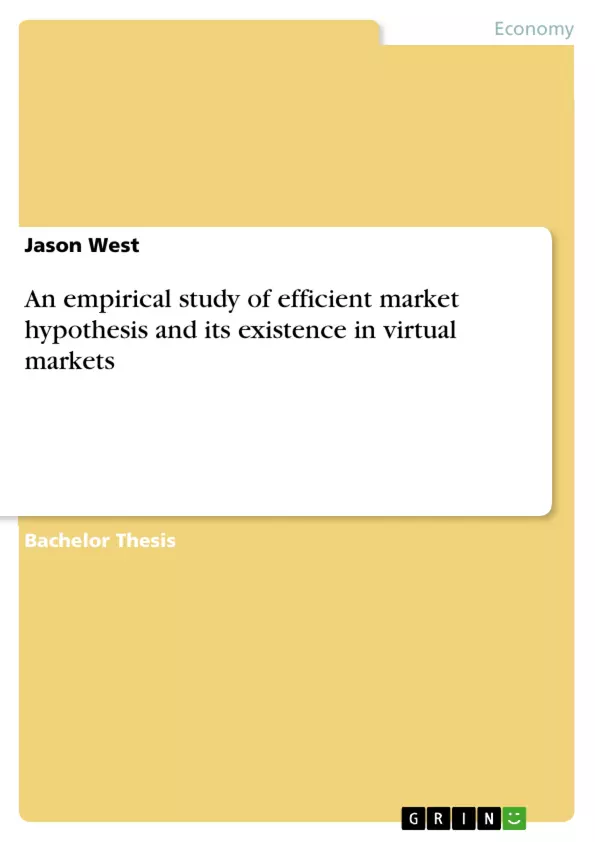Virtual and computer games are rapidly increasing with the introduction of the smartphone and the app stores across multiple platforms and devices with an increase in games with virtual economies. This dissertation will analyse the efficient market hypothesis, along with commonly known anomalies and information announcements. It will find out whether there are market inefficiencies in virtual games in the form of anomalies, more specifically the intra-day effect. The intra-day effect anomaly is one of many critiques of the efficient market hypothesis and there have been many studies conducted into the intra-day effect. Most research on the intra-day effect anomaly is concerning real world markets and the results have contradicted one another.
This study looks at the price change movements of 118 randomly quota sampled player cards within the market of FIFA Ultimate Team. Statistical analysis in the form of mean, standard deviation, and coefficients of variances tests were carried out to identify if there were any market anomalies and reactions to information announcements. A strong correlation between market inefficiencies, anomalies, and information announcements had been discovered within the research of the virtual market in FIFA Ultimate Team. The study actually found that because of an information announcement overreaction and an intra-day effect, at a specific time during a Wednesday, a player could sell their card for potentially 233% more than what they could have an hour earlier. This research study in turn supports that market anomalies do exist in games but it was also discovered that the market is semi-strong form efficient in its reaction post-information announcement.
Inhaltsverzeichnis (Table of Contents)
- Chapter 1 - Introduction
- 1.1 Origin of Efficient Market Hypothesis
- 1.2 Aims and Objectives of the Research
- 1.3 Outline of the Chapters
- Chapter 2 - Literature Review
- 2.1 Introduction
- 2.2 Market Efficiencies
- 2.3 Information Announcements in Capital Markets
- 2.4 Anomalies in Capital Markets
- 2.5 Intra-Day Effect
- 2.6 Judgments and Values in Computer Games
- 2.7 Common Exchange Mechanisms
- 2.8 Regulation of Virtual Markets
- 2.9 Chapter Summary
- Chapter 3 - Methodology
- 3.1 Introduction
- 3.2 Research Questions
- 3.3 Quota Sampling
- 3.4 Method of Data Collection
- 3.5 Method of Data Analysis
- 3.6 Limitations and Validity of the Research Method
- 3.7 Ethical Consideration
- 3.8 Chapter Summary
Zielsetzung und Themenschwerpunkte (Objectives and Key Themes)
This dissertation aims to investigate the efficient market hypothesis (EMH) in the context of virtual games, specifically focusing on FIFA Ultimate Team. The research explores the presence of market inefficiencies, anomalies, and the impact of information announcements within this virtual marketplace.
- Efficient Market Hypothesis in Virtual Games
- Market Anomalies and Information Announcements
- Intra-day Effect in Virtual Markets
- Data Analysis and Statistical Methods
- Regulation and Ethical Considerations
Zusammenfassung der Kapitel (Chapter Summaries)
Chapter 1 introduces the research topic, providing the background and origin of the EMH. It outlines the specific aims and objectives of the study, setting the stage for the subsequent exploration of the hypothesis in the context of virtual games. Chapter 2 delves into a comprehensive literature review, examining the EMH and its variations. It discusses various aspects of market efficiencies, including information announcements, market anomalies, and the intra-day effect. The chapter also explores the unique characteristics of virtual game markets, including regulation and ethical considerations. Chapter 3 details the methodology employed in the research. It outlines the research questions, sampling strategy, data collection methods, and data analysis techniques. The chapter also discusses potential limitations and the validity of the chosen research methods, ensuring ethical considerations were carefully addressed.
Schlüsselwörter (Keywords)
This dissertation explores the presence of the efficient market hypothesis in virtual markets. The study focuses on the identification and analysis of market anomalies, information announcements, and the intra-day effect, using a virtual game market as the research environment. The core concepts include market inefficiencies, statistical analysis, and ethical considerations within the context of virtual game economies.
Frequently Asked Questions
What is the Efficient Market Hypothesis (EMH)?
The Efficient Market Hypothesis suggests that asset prices reflect all available information, making it impossible to consistently achieve higher-than-average returns.
Does EMH apply to virtual economies like FIFA Ultimate Team?
The study found that while virtual markets show strong reactions to information announcements (semi-strong form efficiency), they also contain significant inefficiencies and anomalies.
What is the "intra-day effect" in virtual markets?
The intra-day effect is a market anomaly where prices fluctuate significantly within a single day. In FIFA Ultimate Team, this can lead to price changes of over 200% within a single hour.
How do information announcements impact virtual card prices?
The research shows a strong correlation between information announcements and price overreactions, which traders can exploit to generate significant virtual profits.
What research methods were used to study the FIFA market?
The study used quota sampling of 118 player cards and applied statistical tests including mean, standard deviation, and coefficients of variance to identify price movements.
- Citar trabajo
- Jason West (Autor), 2015, An empirical study of efficient market hypothesis and its existence in virtual markets, Múnich, GRIN Verlag, https://www.grin.com/document/359376



